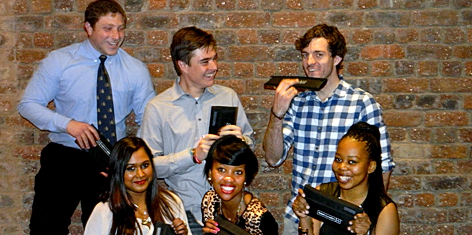Latest News Archive
Please select Category, Year, and then Month to display items
09 November 2018
|
Story Charlene Stanley
|
Photo Charlene Stanley
 Dr Tseliso Ntili, HOD of the Free State Department of Water and Sanitation, warns that pollution caused by mismanagement of municipal water-treatment works puts severe pressure on the province’s water security.
Dr Tseliso Ntili, HOD of the Free State Department of Water and Sanitation, warns that pollution caused by mismanagement of municipal water-treatment works puts severe pressure on the province’s water security.
“Despite our water challenges, Bloemfontein will never become a second Cape Town.” This firm assurance was given by Dr Tseliso Ntili, HOD of the Free State Department of Water and Sanitation, during his presentation at the recent regional seminar of the Faculty of Law’s Environmental Law Association.
The theme of the seminar was Water Quality and Water Security in Bloemfontein and was attended by staff and students from the Faculty of Law and the Faculty of Natural and Agricultural Sciences, as well as relevant role players from private, business, and government sectors.
Not enough water for city’s needs
Water restrictions in some form do seem to remain part of our future landscape though, as Dr Ntsili explained that the city’s current water yield of 218 megalitres per day still fell short of the demand of 259 megalitres per day.
Pollution and mismanagement at municipal level
He pointed out that a big cause for concern was that 75% of the Free State’s waste-water treatment works were dysfunctional. Housekeeping and security at these plants are often severely neglected. Yet, it is difficult for the Department of Water and Sanitation to act against offending municipalities.
“In intra-governmental disputes, the courts must be satisfied that organs of state have taken all reasonable steps to settle contentions – which can be a time-consuming process,” he explained.
Dr Ntsili said that the Caledon River System’s dwindling water levels due to low rainfall and siltation was also a concern, but that plans were underway to supplement the water supply to Bloemfontein via the Gariep Dam by 2026.
However, he warned that poor water management could drastically affect these long-term plans.
“If we can’t manage pollution, the cost will be high. Water security will be challenged, and we will have water shortages – not because of drought, but because of negligence.”
Six of our students on their way to Stanford Sophomore College
2014-08-21

Back, from the left are: Philip Kitsopoulos (BCom Law), Ulrich Kristen (Medicine)
and Stephan Erasmus (Medicine).
The university hosted a send-off function for our students who are about to attend a three-week seminar at Stanford Sophomore College (SoCo).
Six Kovsie students were selected to attend the seminar at the Stanford SoCo in September 2014. This programme is an immersive learning experience where participants attend class meetings during the morning. Their afternoons include class activities, explorations of Stanford, field trips as well as organised events.
UFS students were invited to apply for one of six SoCo courses in February 2014. After months of apprehension, the successful Kovsie applicants were announced in May this year.
These outstanding Kovsie students and the courses they will attend are:
- Sebabatso Makafane, Vuyisile Kubeka and Philip Kitsopoulos – New Millennium Mix: Crossings of Race and Culture;
- Ulrich Kristen – Resistance Writings in Nazi Germany;
- Kaylene Pillay – Ghost Stories: Why the Dead Return and What They Want From Us; and
- Stephan Erasmus – Responses to the AIDS Epidemic.
During the farewell function, Rudi Buys: Dean of Student Affairs, handed the students their flight tickets and visas. This was followed by messages of support from Dr Lis Lange, Directorate for Institutional Research and Academic Planning, and Prof Neil Roos from the Centre for Africa Studies.
Prof Roos concluded the evening’s programme with some advice for these students. “Don’t go there and come back to copy the students and personalities you meet there. Go there and show your own characteristics to them.”
The six Kovsies will depart on 29 August and return home on 19 September 2014.